Gorilla Doctors and Cows
By Gorilla Doctors Staff on Wednesday, November 18th, 2009 in Uncategorized.This week I went with John Huston and Dr. Mike for our monthly visit to MGVP Farm Partners. John is our Agriculture Project Coordinator for the MGVP One Health Program and developed our Farm Partner Project. Dr. Mike is the Director of MGVP and was here for one of his regular visits. The Farm Partner project is an effort to help families in the area around the park increase the productivity of their farms using environmentally friendly husbandry practices like rain catchment, bio-gas and bio-fuels. We also provide veterinary care for their livestock.
Why should Gorilla Doctors be concerned about the health of cows, goats and pigs?! The short answer is that Gorilla Doctors cannot keep Mountain Gorillas healthy unless the animals, people and environment around them are healthy. “One Health”. While the primary concern of Gorilla Doctors is Mountain Gorilla health and conservation, we take a “One Health” approach to achieve that end. In addition to providing veterinary care for the gorillas, we provide veterinary care to other wildlife species in the park. We provide health care to all gorilla guides and trackers. We vaccinate dogs and cats around the park against Rabies. We work with local clinics to improve health care for people who live in the villages around the park. And we are starting this Farm Partner, or Model Farm program.
Pacifique is a young man who just completed his first year at university, and his family farm is one of our partners. His story is truly amazing. He was around 9 years old in 1994, and during the genocide he was separated form his family. A soldier from Interahamwa (the bad paramilitary group during the genocide) found him and took him to Congo where Pacifique lived for the next 3 years. His job was to help this soldier’s wife care for their infant son. The wife died though, and at around 12 years of age Pacifique put the 3 year old son of the soldier on his back and was told to walk to Gishwati where he would find some family of the soldier who would care for the toddler. So Pacific walked with the toddler on his back for over a week, finally finding the family and handing over the toddler.
But what was he to do now? He thought his family back in Ruhengeri were probably dead. He didn’t know where to go. So he started walking, and returned to the place he called home for the first 9 years of his life. When he finally made it back to Ruhengeri, he found that his mother and father were alive and well! They had fled to Uganda and had thought him lost to the war. There was an extremely happy reunion on the day Pacifique came walking into the family home some 10 years ago.
At that time it was not common for a teen to attend secondary school – they were needed on the farm. Pacifique’s family raised goats and grew crops, so lots of help was needed on the family farm. But Pacifique wanted an education, so he went to school as often as he could, and graduated from secondary school when he was over 20 years old. He had even higher aspirations – he wanted to attend university. He has said to me “I need to have a plan for my life. I need to work hard so that I can come home and provide for my mother and father. So I can be a good businessman and improve the family farm.” So he took the required national test and made the highest score in the district, winning him a spot at the National University of Rwanda in Butare, one of the best universities in Rwanda. He is studying Business Administration and doing very well.
I first met Pacifique 2 months ago when he was home for his 3 month break after his first year at university. He is a tall, thin young man with joyful eyes and a calm, open countenance. He works at a local restaurant while not at university making the equivalent of $1.50/day. Unfortunately, the motorbike taxi to and from his house cost him $1.00/day, so his net is pretty small. John lets Pacifique borrow his bicycle to ride the 5 miles to and from home. It would only cost $200 to purchase him a new bicycle, but there is no money for that. All must be saved for the family and university. This young man is serious about his future.
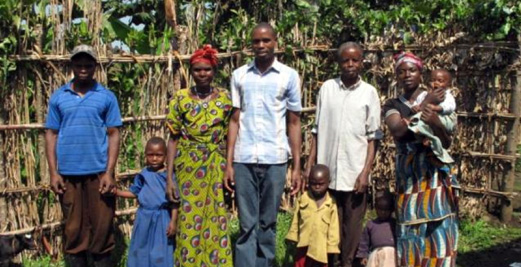 Here is Pacifique and his family. His mother and father on either side of him, one brother and his wife and their kids, just outside the family home.
Here is Pacifique and his family. His mother and father on either side of him, one brother and his wife and their kids, just outside the family home.
Last Saturday John and Dr. Mike and I headed to the farm, which is a small mud brick house north of Ruhengeri, up in the hills close to the park boundary. So close in fact that last year an elephant came out of the forest and raided a couple of farms, seeming to have a vendetta against pigs – he smooshed every pig he came across for some reason! Fortunately he didn’t harm any people, and after several days went back into the forest without further incident.
Pacifique’s family still raises goats, and their 6 goats and 2 kids were tethered in the back yard. Last month we collected fecal samples and found that they all had internal parasites, so they were treated, and this month is the recheck. They also had their hooves trimmed. These ministrations are always a source of much interest and amusement to the kids in the neighborhood! We always draw a large crowd!
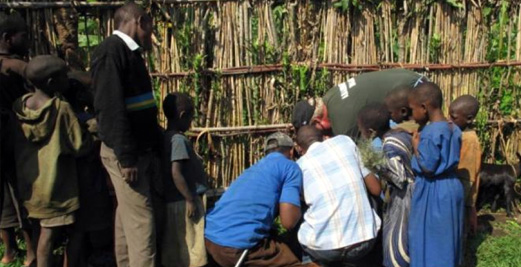 Here’s John trimming hooves.
Here’s John trimming hooves.
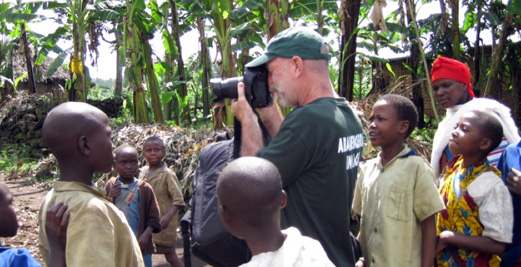 Here’s Dr. Mike taking photos while the kids watch.
Here’s Dr. Mike taking photos while the kids watch.
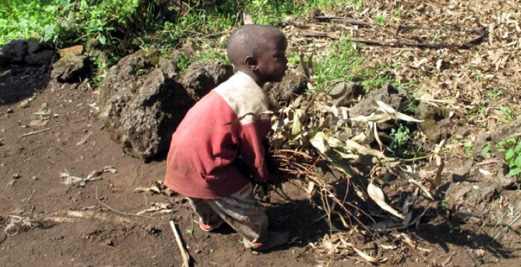 In this neighborhood, everybody works. Here’s a little boy that can’t be more than 3 years old gathering firewood.
In this neighborhood, everybody works. Here’s a little boy that can’t be more than 3 years old gathering firewood.
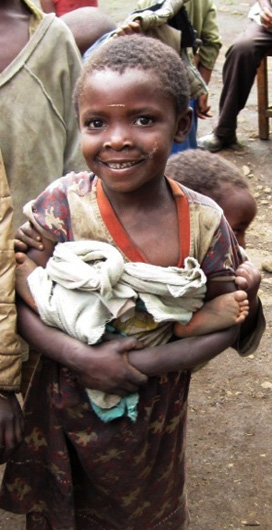 And here’s a little girl not more than 5 years old carrying her little sister.
And here’s a little girl not more than 5 years old carrying her little sister.
While we were at the farm, Pacifique’s brother mentioned that one of the goats seemed a little quite today, so Dr. Mike and I gave her a complete physical examination. Her body temperature was normal, her heart rate and respiratory rate were normal, and her rumen (stomach) was contracting normally, but her lips and gums were a little dry. She was probably a bit dehydrated, which is not a surprise. His family must walk 3 kilometers for water that must serve the family and the animals. One of John’s recommendations to the family is to build a rain catchment system so that there is enough water, easily accessible, for people and livestock. We will work with the family to find the resources to accomplish this.
Another difficulty for these families is fuel (remember the little boy collecting fire wood…). Many people use charcoal, which requires that large numbers of trees be cut, and processed in large kilns. Unfortunately people in need are not above going into the forest.
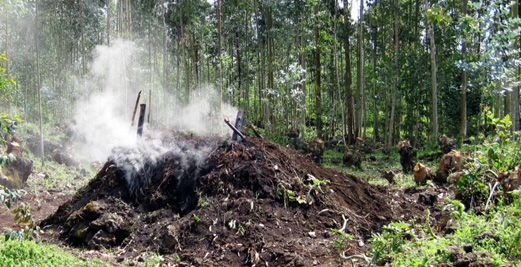 Here is a charcoal kiln near Pacifique’s home.
Here is a charcoal kiln near Pacifique’s home.
This kiln uses wood from a eucalyptus grove planted for this purpose. But there is a better alternative. In DRC (Congo) the park service (ICCN) is building presses that make bio-bricks out of wood shavings, soy husks, shredded paper, etc. This is a wonderful alternative to charcoal, and is extremely environmentally friendly. They are distributed to families around the park, and people can make and sell the bricks as a livelihood. This not only helps these families, but discourages the use of illegal charcoal, which is a HUGE problem in Congo. Last month Dr. Jacques met John and me at the border with a press, and MGVP introduced the first bio-brick press to Rwanda! Immaculee, one of our other Farm Partners, will start a business here in Ruhengeri, and we will be her first customer!
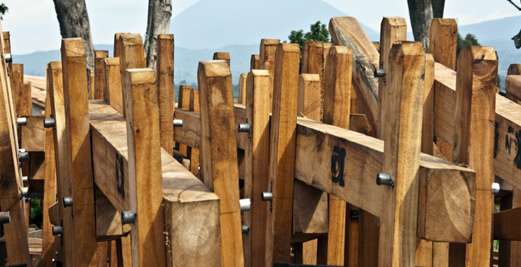 Here are the presses in Rumangabo,Congo.
Here are the presses in Rumangabo,Congo.
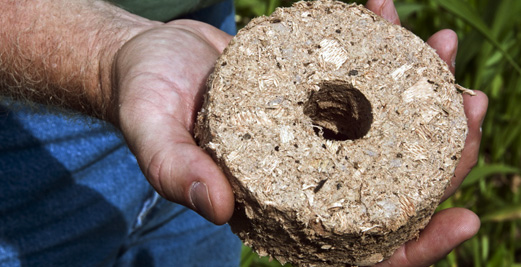 And here is an example of the bio-brick.
And here is an example of the bio-brick.
It is our plan to develop a few farms in villages all around the park. These will serve as models for others in the neighborhood, and the ideas and technology will spread to other families. It is hard work, and slow work, but so very rewarding to work with families like Pacifique’s and Immaculee’s. These are hard working, deserving people who can see the benefit of environmentally friendly options. Who are not only our partners, but our friends. And at the end of the day, THEY will help keep gorillas healthy and happy in their environment.
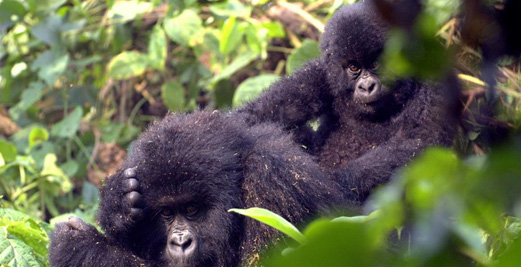
Help the Gorilla Doctors.


 Donate
Donate